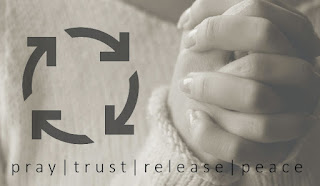(from the transcript of Ed’s 9/4/16 message)
The Cycle of Prayer consists of four elements that are essential for an effective prayer life. And those four things are...
- PRAY
- TRUST
- RELEASE
- PEACE
What that means is that, first, we must actually act. We must pray. Prayer is an actual thing that we do. And this act of prayer begins the cycle.
But prayer isn't just words. It's not an incantation, like in a Harry Potter movie.
Prayer is more like a spiritual trust fall. We bring our petitions to God, not in an effort to get him to do something, but as a recognition that we understand that he's in control.
The more we do this, the less God seems like a genie, or a vending machine, and the more he seems like a father.
So, first we pray, then we trust.
And this trust can't just be an intellectual trust. We must respond appropriately. That's part of trust. If we pray, and we feel called to do something, we need to do it. That's the trust fall.
And when we do that, just like in a real trust fall, we release the outcomes to others. We close our eyes and take a leap of faith, trusting that God's got our back.
But in order to do that, we have to stop thinking that the end results are on us. God uses us, but HE produces the outcomes.
That's why Paul said, "I planted the seed, Apollos watered it, but God has been making it grow.” (1 Corinthians 3:6)
We must trust and respond, but God makes it happen. We leave the saving to God - we just show up.
So, we pray, trust, and release, and as a consequence, God gives us peace.
We've come to him in trust, we've responded, we've released the outcomes to him, and now God gives us peace, because we've done all he asked, and we can know that he's got it from here.
And then we start all over again.
Pray, trust, release, peace.
(And here’s some additional insight for today)
The more we pray, trust, and release, the more we begin to align with the will of God, and the more likely we are to pray for the things that were already on his mind.
God will begin to make your heart break for what breaks his heart, and he will remake you into the person who can love them into a relationship with Jesus.
What’s really awesome about this is that it makes interceding for another soul the greatest possible act of love. It means you are willing to be remade to love them better.
God does the remaking; he does the softening. But he still brings people to himself through us. And if we aren't preparing ourselves for them, where will they go? He doesn't soften their hearts because we ask him to, he softens them because we came to him in the first place.
Then he gives us what we need to walk them in.





